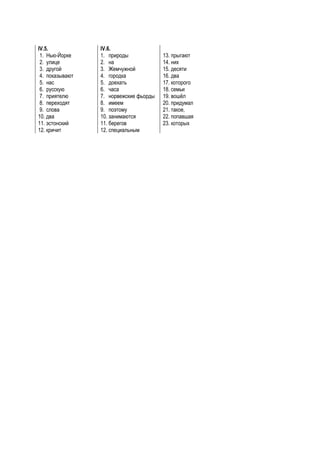Документ содержит набор упражнений для подготовки к экзаменам по иностранным языкам в гимназии, включая задания с заполнением пропусков, преобразование предложений и использование правильной формы слов. Примеры включают задания на заполнение пропусков с использованием правильных форм слов в контексте, а также упражнения на перевод предложений в косвенную речь. Текст ориентирован на проверку и закрепление знаний студентов в различных аспектах языка.
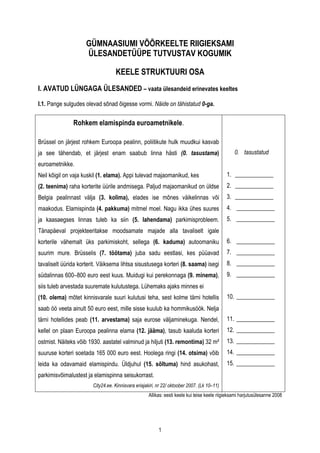
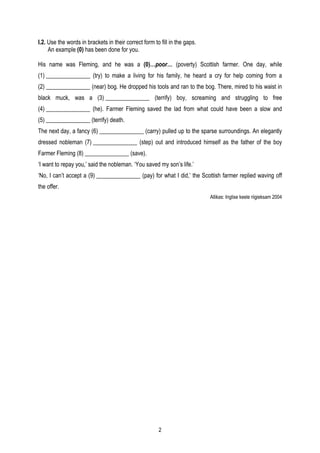
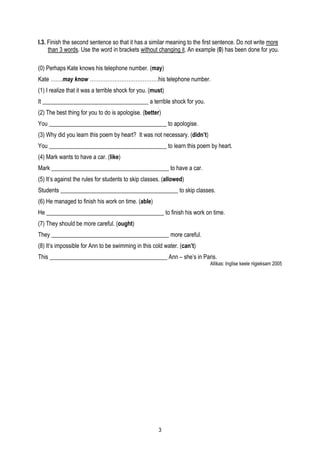
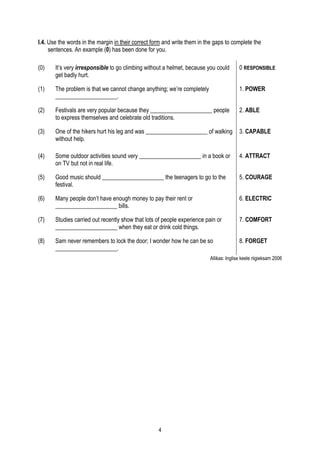
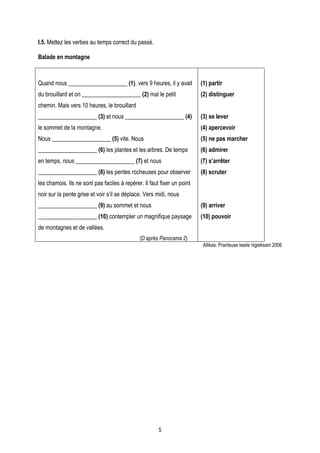
![I.6. Complétez le texte par les verbes conjugués dans un temps convenable (au cas où le temps n’est
pas donné)
Dans notre série "Les Françaises à l'étranger" cette semaine : Interview d'Anne-Marie Lacouture,
originaire de France, installée à Montréal depuis 14 ans.
Question: Anne-Marie, vous [1] (venir) au Québec il y a 14 ans et vous [1] ______________________
n'en êtes jamais repartie. [2] (dire) ― décidé de nous pourquoi [2] ______________________
vous avez vivre ici?
A.-M.: Je venais de terminer mes études de biologie à Lyon quand je
[3] (avoir) la possibilité de partir à Montréal faire un stage de deux mois [3] ______________________
un laboratoire. Je [4] (rencontrer) André cet été-là. [4] ______________________
Il [5] (me plaire) tout de suite. J'avais 23 ans, lui 25. [5] ______________________
Il [6] (venir ) d'obtenir son diplôme d'ingénieur des Travaux publics. [6] ______________________
C'était un grand barbu qui [7] (rire) tout le temps et qui adorait la nature. [7] ______________________
Nous [8] (se promener) partout et André m'a fait aimer Québec. A la fin [8] ______________________
de mon stage, André m'a demandé si je [9] (vouloir) rester à Montréal. [9] ______________________
Il [10] (me dire) que je pouvais habiter chez lui et qu'avec mes diplômes [10] _____________________
je [11] [trouver – Futur dans le passé] facilement du travail. J'ai [11] _____________________
accepté.Dix jours après, j'habitais chez André et j'avais un emploi dans
un laboratoire pharmaceutique.
Question: Et vos parents, comment est-ce qu'ils
[12] (prendre – Passé composé) la chose? [12] _____________________
A.-M.: Ils [13] (croire – Imparfait) que je rentrerais au bout de quelques mois. [13] _____________________
Je leur donnais souvent des nouvelles, et un jour, c'est mon faire-part de
mariage qu'ils [14] (recevoir). Je ne savais pas comment ils [14] _____________________
[15] (aller) réagir. Ils m'ont téléphoné tout de suite pour me féliciter. [15] _____________________
Malgré la distance,ils sont venus à Montréal pour mon mariage!
Question: Après quatorze ans passés ici, vous êtes considérée par vos amis
comme une Québécoise ou comme une Française?
A.-M.: Pour eux, je reste encore "la Française" qui n'a pas perdu son accent.
D'ailleurs ils pensent qu'un jour je [16] (rentrer – Futur simple ) dans [16] _____________________
mon pays.
6](https://image.slidesharecdn.com/keelestruktuuriosa-090923003046-phpapp02/85/Keele-Struktuuri-Osa-6-320.jpg)
![Question: Et si vous retourniez vivre en France, est-ce que vous
[17] (avoir)du mal à vous réhabituer? [17] _____________________
A.-M.: Euh, je ne sais pas. Mais pour moi la question ne se pose pas. D'abord,
mes enfants sont canadiens. Ensuite, tous mes amis sont ici et j'ai une
vie très agréable. Et puis, si je [18] (vouloir), je serais déjà retournée! [18] _____________________
Question: En résumé, vous avez réussi votre intégration dans ce pays.
A.-M.: Je dois dire que je n'ai jamais été vraiment une immigrée, je n'ai donc
pas eu les problèmes des immigrées qui [19] (devoir – Présent) lutter [19] _____________________
pour s'installer. Je suis très contente que le Canada m'ait acceptée
comme la sienne, mais je ne pense pas qu'on [20] (pouvoir) s'intégrer [20] _____________________
tout à fait. On garde toujours une certaine nostalgie du pays d'où l'on
vient et le sentiment que ses racines sont ailleurs.
Allikas: Prantsuse keele riigieksam 2003
7](https://image.slidesharecdn.com/keelestruktuuriosa-090923003046-phpapp02/85/Keele-Struktuuri-Osa-7-320.jpg)
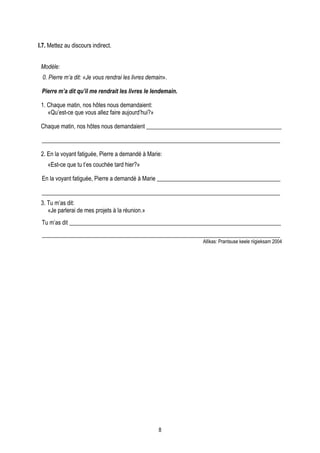
![I.8. Complétez les phrases avec un verbe conjugué au présent et un adverbe dérivés des couples de
mots (nom-adjectif) donnés en haut de chaque phrase.
Modèle:
Vente difficile
Une étude américaine a prouvé que les appartements dont les numéros commencent par 13 se
vendent beaucoup plus difficilement que les appartements identiques aux autres étages.
1. Travail lent
Les écologistes __________________ [1] __________________ [2] mais avec détermination pour
changer les mentalités consommatrices de leurs co-citoyens.
2. Accueil chaleureux
Nos élèves participant au programme d'échanges en France disent qu'on les __________________ [3]
si __________________ [4] qu'ils s'y sentent comme chez eux.
3. Connaissance parfaite
Comme nous habitons à Tartu depuis vingt ans, nous _________________ [5] _________________ [6]
l’histoire de cette ville.
4. Intérêts particuliers
Cet historien s’__________________ [7] __________________ [8] à la vie quotidienne au Moyen Âge.
Allikas: Prantsuse keele riigieksam 2005
9](https://image.slidesharecdn.com/keelestruktuuriosa-090923003046-phpapp02/85/Keele-Struktuuri-Osa-9-320.jpg)
![I.9. Complétez le texte
Le jour où Lullaby décida qu’elle n’irait plus à l’école, c’était encore très tôt ____________ [1] matin,
vers le milieu ____________ [2] mois d’octobre. Elle quitta son lit, elle traversa pieds nus sa chambre et
elle écarta ____________ [3] peu les lames des stores ____________ [4] regarder dehors. Il y avait
beaucoup ____________ [5] soleil, et en se penchant un peu, elle put voir ____________ [6] morceau
de ciel bleu. En bas, ____________ [7] le trottoir, trois ou quatre pigeons sautillaient, leurs plumes
ébouriffées par le vent. Au-dessus ____________ [8] toits des voitures arrêtées, la mer était bleu
sombre, et il y avait un voilier blanc ____________ [9] avançait difficilement. Lullaby regarda tout cela.
Et elle ____________ [10] sentit soulagée d’avoir décidé ____________ [11] ne plus aller à l’école.
Elle retourna vers ____________ [12] centre de la chambre, elle s’assit devant sa table, et sans allumer
la lumière elle commença ____________ [13] écrire une lettre.
Bonjour cher Papa,
Il fait beau aujourd’hui, le ciel est comme j’aime très très bleu. Je voudrais bien ____________ [14] tu
sois là pour voir le ciel. La mer aussi est très très bleue. Bientôt ____________ [15] sera l’hiver. C’est
____________ [16] autre année très longue qui commence. J’espère que tu pourras venir bientôt
____________ [17] je ne sais pas si le ciel et la mer vont pouvoir t’attendre longtemps. Ce matin quand
je ____________ [18] suis réveillée (ça fait maintenant plus ____________ [19] une heure) j’ai cru que
j’étais à nouveau comme à Istamboul. Tu ____________ [20] souviens? Tu avais acheté deux bouquets
____________ [21] fleurs, un pour moi et un pour sœur Laurence. ____________ [22] grandes fleurs
blanches qui sentaient fort. Elles sentaient ____________ [23] fort qu’on avait dû ____________ [24]
mettre dans la salle de bains. Tu avais dit qu’on pouvait boire ____________ [25] eau dedans, et moi
j’étais allée à la salle de bains et j’avais bu longtemps, et mes fleurs s’étaient toutes abîmées.
Lullaby s’arrêta ____________ [26] écrire. Elle mordilla ____________ [27] instant le bout de son Bic
bleu, en regardant la feuille de papier ____________ [28] lettres. Mais elle ____________ [29] lisait
pas. Elle regardait seulement le blanc ____________ [30] papier, et elle pensa que peut-être quelque
chose allait apparaître, comme des oiseaux dans le ciel, ou comme un petit bateau blanc qui passerait
lentement.
D’après J.M.G. Le Clézio Lullaby, Gallimard 1978
10](https://image.slidesharecdn.com/keelestruktuuriosa-090923003046-phpapp02/85/Keele-Struktuuri-Osa-10-320.jpg)
![1.10. Utilisez les mots entre parenthèse à la forme convenable
Exemples: Vous reconnaîtrez ____________ (facile) l’auteur de ce roman. – Vous reconnaîtrez
facilement l’auteur de ce roman.
Les Parisiens lisent souvent le journal en ____________ (prendre) le métro. – Les Parisiens lisent
souvent le journal en prenant le métro.
1. Brigitte ne boit pas de café parce qu’elle trouve que c’est une boisson trop __________________ [1]
(exciter).
2. Pourriez-vous m’expliquer le __________________ [2] (fonctionner) de cet appareil?
3. Jean est tombé malade en __________________ [3] (manger) des huîtres.
4. Les essais de cet écrivain sont __________________ [4] (particulier) intéressants.
5. Les récompenses du festival seront __________________ [5] (remettre) par le président du jury.
6. La semaine de travail compte __________________ [6] (seul) 40 heures.
7. De nos jours, il est important de connaître plusieurs langues __________________ [7] (vivre).
8. Le gouvernement se prépare à la __________________ [8] (célébrer) du 90e anniversaire de la
République d’Estonie.
9. Pierre est vraiment __________________ [9] (courage) s’il a accepté ce travail.
10. Il faut décorer la salle avant l’__________________ [10] (arriver) des invités.
11](https://image.slidesharecdn.com/keelestruktuuriosa-090923003046-phpapp02/85/Keele-Struktuuri-Osa-11-320.jpg)
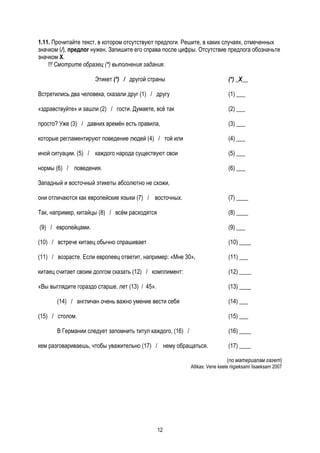
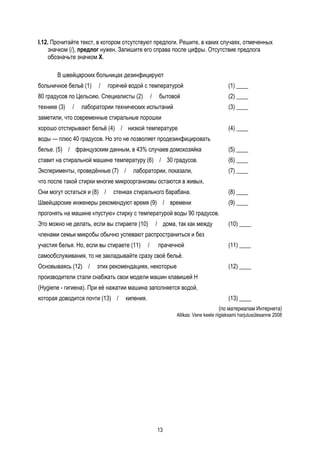
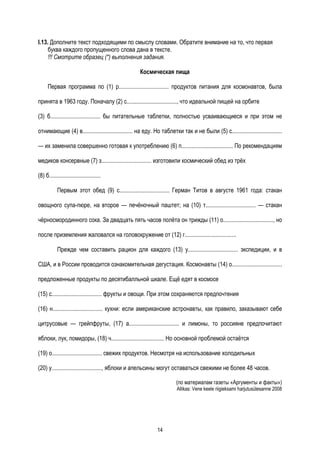
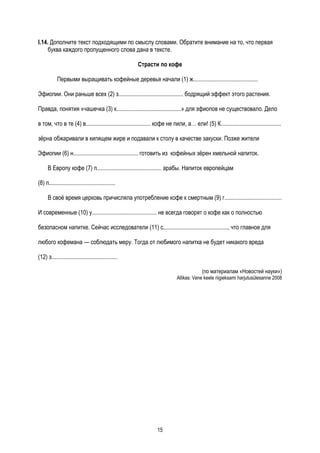
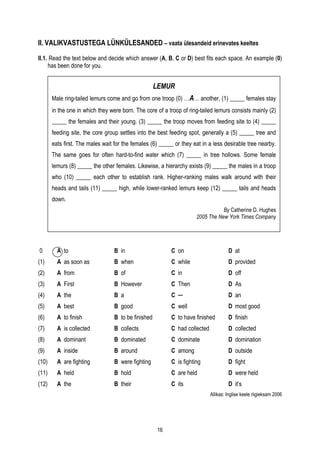
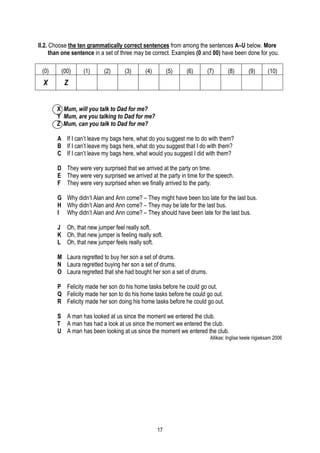
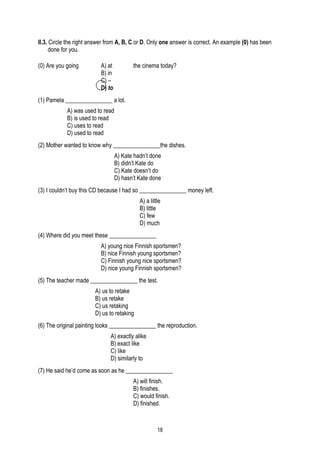
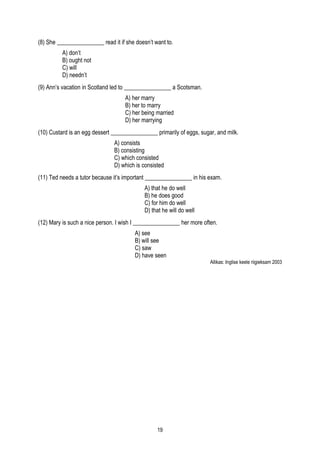
![II.4. Choisissez la bonne forme (A, B ou C) pour compléter le texte.
A B C
____ [1] premier étage, tout au bout d’un couloir, le patron frappe, [1] au en sur
attend ____ [2] secondes et, [2] quelques-unes quelques beaucoup
comme ____ [3] réponse ne [3] aucune rien sans
____ [4] parvient, frappe de nouveau, plusieurs coups, [4] le leur lui
____ [5] plus fort. [5] un peu peu petit
De l’autre côté de la porte un réveille-matin se met à
sonner. ____ [6] main droite figée dans son geste, le patron [6] une la les
reste à l’écoute, guettant avec méchanceté ____ [7] [7] les ses de
réactions du dormeur.
Mais ____ [8] n’arrête la sonnerie. [8] quelqu’un on personne
Au bout ____ [9] minute environ elle s’éteint d’elle-même [9] de la de d’une
avec étonnement sur quelques sons avortés.
Le patron frappe ____ [10] une fois : toujours rien. Il [10] plus encore pour
entrebâille la porte et passe la tête; dans le matin
misérable on distingue le lit défait, la chambre en désordre.
Il entre tout à fait et inspecte les lieux: ____ [11] de suspect, [11] quelque chose rien aucun
seulement le lit vide, un lit à deux personnes, sans oreiller,
avec une seule place marquée au milieu du traversin,
les couvertures rejetées vers le pied; ____ [12] la table de [12] dans à sur
toilette, la cuvette de tôle émaillée pleine ____ [13] eau sale. [13] de l’ d’ du
Bon,l’homme est déjà parti, ____ [14] le regarde après tout. Il [14] ça ce il
est sorti sans passer par la salle, il savait qu’il n’y aurait
pas encore ____ [15] café chaud et en somme il n’avait pas [15] du de une
à prévenir. Le patron s’en va en haussant les épaules;
il n’aime pas ____ [16] gens qui se lèvent avant l’heure. [16] des de les
A. Robbe-Grillet Les gommes, Minuit 1953.
Allikas: Prantsuse keele riigieksam 2004
20](https://image.slidesharecdn.com/keelestruktuuriosa-090923003046-phpapp02/85/Keele-Struktuuri-Osa-20-320.jpg)
![II.5. Choisissez la bonne variante:
[1] Vous devez assister à ce cours ____________ vous êtes souffrant.
a) sauf si b) bien que c) pour que d) malgré
[2] Il neige sans cesse depuis deux jours ____________ nous soyons en plein mois de mars.
a) pour que b) bien que c) pourtant d) même si
[3] Il ne s’est pas rendu à son rendez-vous ____________ il était tombé en panne.
a) avant qu’ b) pendant qu’ c) de sorte qu’ d) sous prétexte qu’
[4] Elle a provoqué un accident ____________ elle roulait trop vite.
a) après qu’ b) parce qu’ c) même si d) de sorte qu’
[5] Elle a joué ________ mal ________ une grande partie du public est partie.
a) tant... qu’ b) si... qu’ c) bien... qu’ d) autant... que
[6] Pierre est parti en Allemagne, ____________ vous ne le verrez plus.
a) pour que b) par contre c) c’est pourquoi d) même
[7] Le caissier vérifie toujours ses comptes ____________ il n’y ait pas d’erreurs.
a) pour b) parce qu’ c) avant qu’ d) pour qu’
[8] ____________ il est journaliste à la télévision, on le reconnaît dans la rue.
a) avant qu’ b) pendant qu’ c) depuis qu’ d) bien qu’
Allikas: Prantsuse keele riigieksam 2007](https://image.slidesharecdn.com/keelestruktuuriosa-090923003046-phpapp02/85/Keele-Struktuuri-Osa-21-320.jpg)
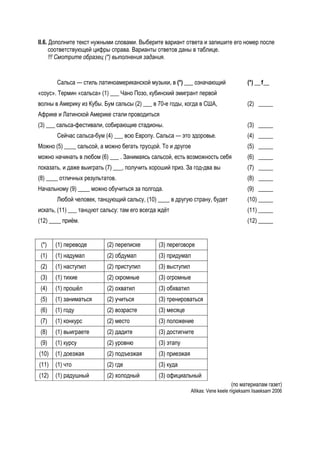
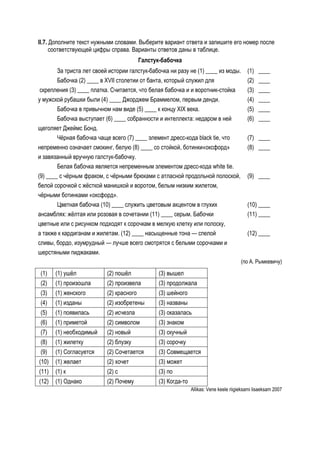
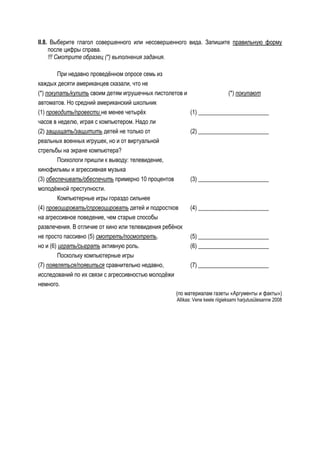
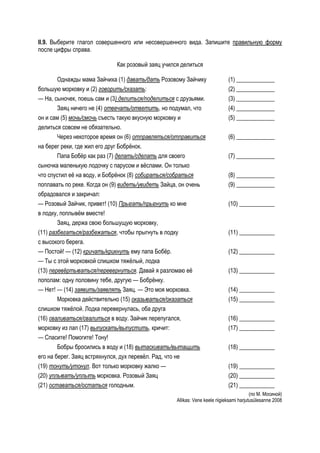
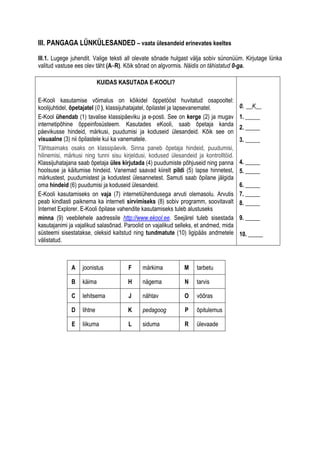
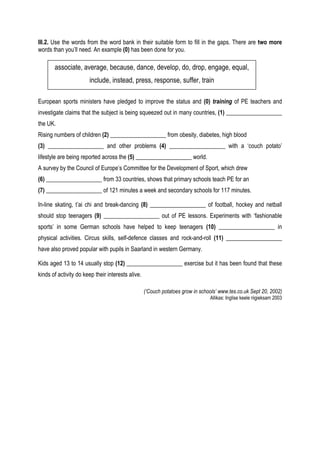
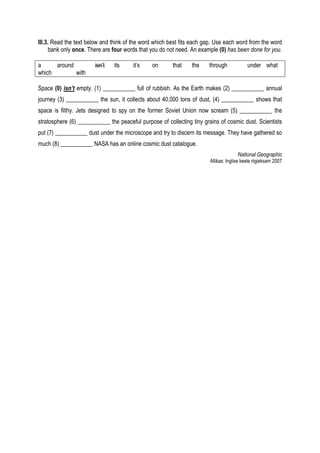
![III.4. Complétez le texte en choisissant parmi les éléments ci-dessous. Attention! Il y a un élément qui
ne convient pas.
de sa des lesquelles ainsi que avec par
de la son le dont qu’ à pour
un ses où qui en
Oscar Wilde est __________ [1] écrivain irlandais. Il est né à Dublin, en 1854, a fait __________ [2]
brillantes études, notamment à Oxford __________ [3] il obtient un prix de poésie en 1878, et très vite
se fait remarquer par __________ [4] idées. Il est en effet un fervent adepte __________ [5] théorie de
« l’art pour l’art », théorie __________ [6] il défend brillamment lors de conférences en Amérique, pays
où d’ailleurs il fait jouer sa première pièce Vera.
En France, il rencontre Verlaine et la plupart __________ [7] poètes symbolistes: et, de retour
__________ [8] Angleterre, il publie ses œuvres qui vont __________ [9] rendre célèbre,
parmi __________ [10]: Le Prince heureux et autres contes en 1888, Le Portrait de Dorian Gray,
__________ [11] de nombreuses pièces de théâtre __________ [12] Salomé, écrite directement en
français, __________ [13] est jouée à Paris par Sarah Bernhardt.
Cependant, parvenu au faîte de la gloire, Oscar Wilde est attaqué dans son pays __________ [14] sa
manière de vivre peut-être trop excentrique pour __________ [15] époque: condamné __________ [16]
une peine de prison, il finira __________ [17] quitter l’Angleterre pour la France où il terminera
__________ [18] vie.
Il meurt à Paris en 1900.
(Préface dans Oscar Wilde L’anniversaire de l’infante, Gallimard 1978)
Allikas: Prantsuse keele riigieksam 2007](https://image.slidesharecdn.com/keelestruktuuriosa-090923003046-phpapp02/85/Keele-Struktuuri-Osa-29-320.jpg)
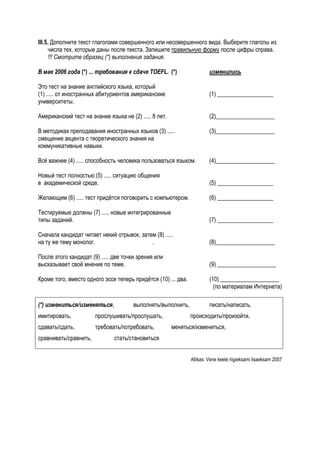
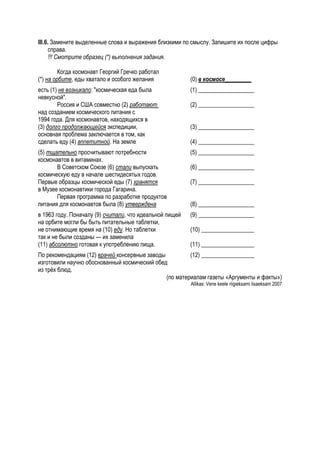
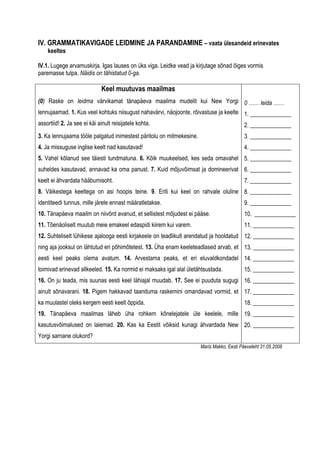
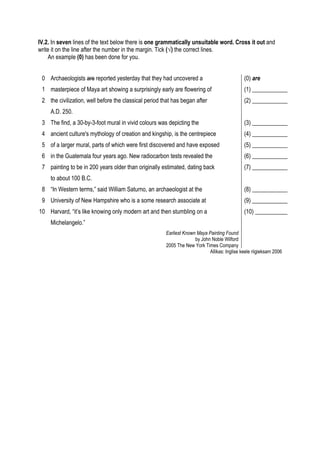
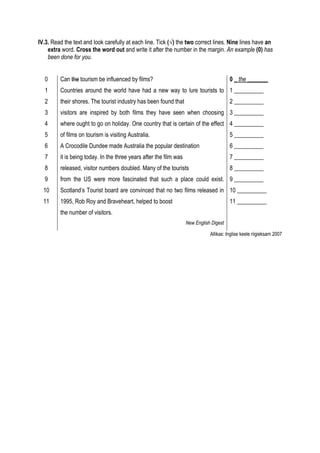
![IV.4. Dans le dialogue suivant, il y a une faute sur chaque ligne. Soulignez les fautes, trouvez la bonne
variante et écrivez la construction correcte derrière le numéro correspondant.
- Allô, bonjour madame, pourrais-je parler à Charlotte?
- Ne quittez pas, je la vous passe. [0]
- Charlotte, c’est Nicolas. Tu as allée au lycée cet après-midi? [1]
- Évidemment que j’en suis allée. Pourquoi? [2]
- Tu pourrais me dire que vous avez fait en français et en histoire? [3]
- En français, on avons étudié un poème de Baudelaire, Spleen, tu connais? [4]
- Ah oui, je crois que j’ai le déjà lu. Le prof vous a parlé de Baudelaire? [5]
- Oui, elle nous a parlé d’en. Pour le prochain cours, on doit faire une recherche sur lui. [6]
- Tu veux dire qu’on la peut faire en bibliothèque? [7]
- C’est ça. Et en histoire, on a commencé à étudié la Commune. [8]
- Tu n’as qu’à regarder dans son livre. [9]
- Cette période, je connais la très bien; je l’ai déjà étudiée l’an dernier. [10]
J’imagine que tu as pris des notes, tu peux me les passer pour que je les recopierais? [11]
- Écoute, les demande plutôt à Antoine, [12]
miennes sont illisibles. [13]
- D’accord, je vais lui les demander mais je n’aime pas avoir affaire à lui [14];
il toujours fait des histoires. [15]
- Alors demandes à Pauline, tu peux compter sur elle. [16]
- Bonne idée, merci et à demain.
Modèle : [0] je vous la passe
[1] ________________________ [9] ________________________
[2] ________________________ [10] _______________________
[3] ________________________ [11] _______________________
[4] ________________________ [12] _______________________
[5] ________________________ [13] _______________________
[6] ________________________ [14] _______________________
[7] ________________________ [15] _______________________
[8] ________________________ [16] _______________________
(D’après Évelyne Sirejols, Pierre Calude Grammaire. 450 nouveaux exercices, CLE international, 1997)
Allikas: Prantsuse keele riigieksam 2006](https://image.slidesharecdn.com/keelestruktuuriosa-090923003046-phpapp02/85/Keele-Struktuuri-Osa-35-320.jpg)
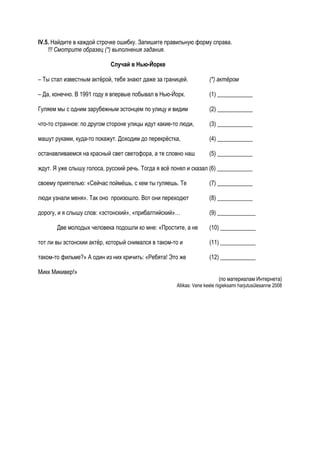
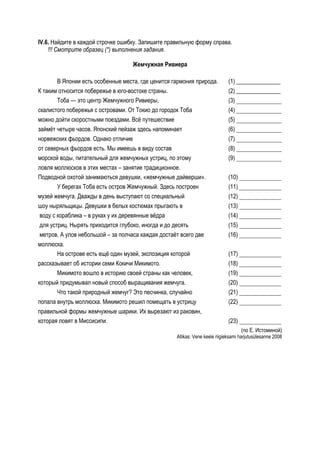
![KEELESTRUKTUURI OSA ÜLESANNETE VASTUSED
I.1. I.2. I.3. I.4.
1. elada 1. trying 1. must have been/ 1. powerless
2. teenivad 2. nearby must’ve been 2. enable
3. kolinud 3. terrified 2. had better / ‘d better 3. incapable
4. pakutakse 4. himself 3. didn’t need / did not 4. attractive / unattractive
5. lahendada 5. terrifying, terrible need / didn’t have /did 5. encourage
6. kaob 6. carriage not have 6. heat
7. töötab 7. stepped 4. would like 7. discomfort
8. saab 8. had saved 5. are not allowed 8. forgetful
9. minna/minnakse/lähed 9. payment 6. was able
10. ole 7. ought to be
11. arvestama 8. can’t be /cannot be /
12. jääda can not be
13. remonditud
14. otsides
15. sõltub
I.5. I.6. 11. trouverais I.7.
[1] sommes partis 1. êtes venue 12. ont pris 1. ce que nous allions
[2] distinguait 2. dites 13. croyaient faire ce jour-là.
[3] s’est levé 3. ai eu 14. ont reçu 2. si elle s’était couchée
[4] avons aperçu 4. ai rencontré 15. allaient tard la veille.
[5] ne marchions pas 5. m’a plu 16. rentrerai 3. que tu parlerais de tes
[6] admirions 6. venait 17. auriez projets à la réunion.
[7] nous arrêtions / nous 7. riait 18. j’avais voulu (je
nous sommes arrêtés 8. [nous] nous sommes voulais)
[8] scrutions / avons promenés ([nous] nous 19. doivent
scruté promenions) 20. puisse
[9] sommes arrivés 9. voulais
[10] avons pu 10. m’a dit
I.8. I.9.
1. travaillent [1] le [11] de [21] de
2. lentement [2] du [12] le [22] De
3. accueille [3] un [13] à [23] si
4. chaleureusement [4] pour [14] que [24] les
5. connaissons [5] de [15] ce [25] de l’
6. parfaitement [6] un [16] une [26] d’
7. (s’) intéresse [7] sur [17] parce que [27] un
8. particulièrement [8] des [18] me [28] à
[9] qui [19] d’ [29] ne
[10] se [20] te [30] du](https://image.slidesharecdn.com/keelestruktuuriosa-090923003046-phpapp02/85/Keele-Struktuuri-Osa-38-320.jpg)
![1.10. I.11. I.12.
1. excitante 1. без предлога 10. при 1. без предлога
2. fonctionnement 2. в 11. о 2. по
3. mangeant 3. с 12. без предлога 3. из
4. particulièrement 4. в 13. на 4. при
5. remises 5. У 14. Для/У 5. По
6. seulement 6. без предлога 15. за 6. без предлога
7. vivantes 7. от 16. с 7. в
8. célébration 8. во 17. к 8. на/в
9. courageux 9. с 9. от
10. arrivée 10. без предлога
11. в
12. на
13. до
I.13. I.14. II.1. II.2.
(1) разработке (13) участника 1. жители 1. C 1. B
(2) считали (14) оценивают 2. заметили 2. B 2. C
(3) были (15) свежие 3. кофе 3. D 3. D
(4) времени (16) национальной 4. времена 4. C 4. E
(5) созданы (17) апельсины 5. Кофейные 5. B 5. G
(6) пища (18) чеснок 6. начали 6. A 6. L
(7) заводы (19) отсутствие 7. привезли 7. B 7. N
(8) блюд (20) установок 8. понравился 8. C 8. O
(9) съел 9. грехам 9. C 9. P
(10) третье 10. учёные 10. D 10. U
(11) обедал 11. считают 11. A in any order
(12) голода 12. здоровью 12. B
II.3. II.4. II.5. II.6. II.7.
1. D 1. A (au) (1) — 3 (1) — 3
[1] a) sauf si
2. A 2. B (quelques) (2) — 1 (2) — 1
[2] b) bien que
3. B 3. A (aucune) (3) — 3 (3) — 3
[3] d) sous prétexte
4. D 4. C (lui) (4) — 2 (4) — 2
qu’
5. B 5. A (un peu) (5) — 1 (5) — 1
[4] b) parce qu’
6. C 6. B (la) (6) — 2 (6) — 2
[5] b) si... qu’
7. D 7. A (les) (7) — 1 (7) — 1
[6] c) c’est pourquoi
8. D 8. C (personne) (8) —3 (8) —3
[7] d) pour qu’
9. D 9. C (d’une) (9) — 2 (9) — 2
[8] c) depuis qu’
10. B 10. B (encore) (10) — 3 (10) — 3
11. A 11. B (rien) (11) — 2 (11) — 2
12. C 12. C (sur) (12) — 1 (12) — 1
13. B (d’)
14. A (ça)
15. B (de)
16. C (les)](https://image.slidesharecdn.com/keelestruktuuriosa-090923003046-phpapp02/85/Keele-Struktuuri-Osa-39-320.jpg)
![II.8. II.9. III.1. III.2.
1. проводит 1. дала 12. крикнул 1. L 1. including
2. защищать 2. сказала 13. перевернётся 2. D 2. suffering
3. обеспечивают 3. поделись 14. заявил 3. J 3. pressure
4. провоцируют 4. ответил 15. оказалась 4. F 4. associated
5. смотрит 5. сможет 16. свалились 5. R 5. developed
6. играет 6. отправился 17. выпустил 6. P 6. responses
7. появились 7. сделал 18. вытащили 7. N 7. average
8. собрался 19. утонул 8. C 8. instead
9. увидел 20. уплыла 9. E 9. dropping
10. Прыгай 21. остался 10. O 10. engaged
11. разбежался 11. dancing /
dances
12. doing
III.3. III.4. III.5. III.6.
1. It’s [1] un [11] ainsi que 1. требуют 1. не появлялось/не было
2. its [2] de [12] dont 2. менялся 2. трудятся
3. around [3] où [13] qui 3. произошло 3. длительной
4. which [4] ses [14] pour 4. становится 4. привлекательной
5. through [5] de la [15] son 5. имитирует 5. внимательно
6. with [6] qu’ [16] à 6. сдавать 6. начали
7. the/that [7] des [17] par 7. выполнить 7. находятся
8. that [8] en [18] sa 8. прослушивает 8. разработана
[9] le 9. сравнивает 9. думали
[10] lesquelles 10. писать 10. питание
11. совершенно
12. докторов
IV.1. IV.2. IV.3. IV.4.
1. kohtaks 17. sõnavara 1. are 1. had [1] tu es allée
2. reisijate 18. omandatavad 2. has 2. been [2] j’y suis allée
3. inimeste 19. kõnelejaid 3. was 3. both [3] ce que vous avez fait
4. missugust 20. võiks 4. √ 4. ought [4] on a étudié / nous avons étudié
5. kõlab 5. have 5. visiting [5] je l’ai déjà lu
6. panuse 6. the 6. a [6] de lui
7. ähvarda 7. in 7. being [7] on peut la faire
8. väikeste 8. √ 8. √ [8] à étudier
9. järgi 9. some 9. more [9] dans ton / le / ce livre
10. avatud 10.√ 10. no [10] je la connais
11. kiiremini 11. √ [11] recopie
12. kirjakeelt [12] demande-les
13. keeleteadlasi [13] les miennes
14. eluvaldkondades [14] les lui demander
15. norme [15] il fait toujours
16. muutub [16] demande](https://image.slidesharecdn.com/keelestruktuuriosa-090923003046-phpapp02/85/Keele-Struktuuri-Osa-40-320.jpg)
